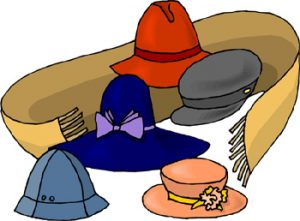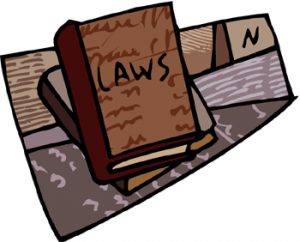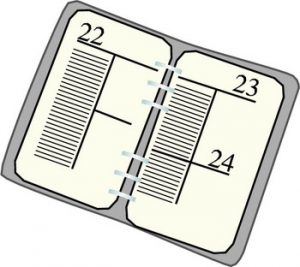A Twenty Year Journey
Twenty years ago I started a journey as the WHCS Government Club Advisor. Like so many adventures, it started small, without a full understanding of where the adventure would lead, or how long it would last.

That first year we had six members on our first (of 43) Judicial teams. Between then and now I’ve taken as few as six students to Judicial, and as many as 21 (the one year we had three teams and three judges). And I have taken as few as three students to Youth Legislature, and as many as twelve. All told I accompanied over 200 students and dozens of adults to 21 Judicial competitions and 20 Legislative conferences.
The Many Hats I Wore
Throughout that time I wore many hats, including Mom, Advisor, Coach, Team Mom, Driver, and Nurse. There were good times and not so good times, but overall it was an amazing experience and a journey that I am very thankful to have taken. I have been able to have a role (ranging from quite small to decently large) in the lives of some amazing teenagers throughout those years. I have laughed with them and cried with them, I have coached them, I have mentored them, and I have taught them. But I have also learned from them and with them.
Together We Traveled

We have traipsed across the state together, on dozens of trips to and from Anniston, Birmingham, Tuscaloosa, and Montgomery. I have accompanied students to national events in Virginia and Oklahoma and on numerous field trips to Virginia and D.C. – where together we added to our knowledge of history, government, and Shakespeare.
Amazing Students
Throughout it all, my heart has been blessed by the wisdom and understanding of so many of these students. Without all of this in my life during the last two decades I would have saved some time, saved some money, and missed out on so much more.
Thank You to the Helpful Adults!

And I certainly have not done this alone. Throughout all of this there have been countless adults who joined me on one or more of these endless trips – helping me with the driving, the chaperoning, the coaching, the meal purchasing and meal preparation (especially when we had the choice of NOT buying meal tickets!), and so much more. I would love to thank all the various folks who helped along the way, but I know if I start listing names, I would miss someone and that would make me sad. So I will cheat with a blanket “thank you so much” to those who have assisted, and assume you each know I mean you!
My Last Youth Legislature

This past weekend, twenty years since the beginning of all this, I took my final six students to our last Legislative event. It was a bittersweet feeling. I knew the end was approaching. I had already passed the reins of Judicial on to two family members after our competition last fall. And I knew that Youth Leg couldn’t be far behind. But it wasn’t until we were at least half way through the weekend that I realized that this one was, indeed, to be my last official event. It wasn’t anything big that told me that, it was more the little things – the food I shouldn’t be eating with my recent diagnosis of diabetes, but that I was paying for regardless; the frustration of knowing that yet again my students had written bills that wouldn’t be debated; and then the aggravation of watching them try, again and again, to participate in the debate, while being shut out.
Frustrations Over Benefits
I’ve always said that as long as the benefits of participating outweighed the frustrations being caused, we could justify our continued participation. But this weekend, at least where Youth Legislature was concerned, the scales finally tipped. We had become spectators at an event that spoke of the value of participation. We had been shut off as having opinions no one wanted to hear. Bill after bill came to the floor where a small variety of speakers stood time and again to praise their merits. But no one wanted to hear another side. True debate was shut out as the student leadership doggedly avoided calling on anyone who might stir up controversy. It was as if they were afraid of actually having to think.
Who Us? Listen to You?

We had seen the start of a trend that direction the previous year, when my students did much more watching than participating. But this year the trend blossomed into a full-blown attack. Not only were my students not allowed to speak, they were indirectly mocked by more than one speaker who felt it necessary to criticize all who could even think of speaking against such a marvelous bill as this one or that one. It was tragic to see what this once great program had become.
As we sat at dinner that last night discussing the high and low points for each of us from the weekend, I told my students that ultimately they were not the real losers this weekend. They had formulated their ideas, written up their arguments, and actually thought about what was right and wrong with the various bills they wanted to speak against. It was the other students who would never hear those arguments that were the ones who had lost out. The ones who were convinced that everyone thought like them, that might honestly have believed that because no one got up and spoke against a bill, that there was no one there who disagreed with them – they were the ones who had missed out.
Youth in Government
The Alabama Youth in Government program has been a huge part of my life, my children’s lives, and countless of my students. It has given us much and taught us much. It is with a sad heart that I watch our participation in this portion of a once great program come to an end.
Happy learning!
Cathy



 As yesterday was coming to a close I realized I had missed my deadline – the deadline for this week’s blog post.
As yesterday was coming to a close I realized I had missed my deadline – the deadline for this week’s blog post. I also won’t apologize for the context of this post, a topic that I have addressed several times in the more or recent past, and that some of you may be tired of hearing. But, if you have heard
I also won’t apologize for the context of this post, a topic that I have addressed several times in the more or recent past, and that some of you may be tired of hearing. But, if you have heard  This was my twenty-first year to be the advisor for the
This was my twenty-first year to be the advisor for the  These kids brought me to tears (not a first for a Mock Trial weekend, sadly). But this was the first time that those were all tears of joy. I cannot think of one time in the entire weekend that I was angry with any of them, or even slightly annoyed for that matter. In spite of room issues the first night, late nights all weekend, and last minute changes to their trial plans when both teams had their opening lawyers start a day not feeling well, they hung in there, worked together, and continued to do their best. One team even had to do more trials than they felt like they had agreed to (four is the promised number of trials, with some teams getting a fifth, and generally only the top two teams getting in a sixth trial). But this weekend they had the two expected trials on Saturday, followed by four in a row on Sunday (most likely a record!) They were tired, some of them were more than a little overwhelmed by the extra efforts required by the two extra trials, but they all gave it their best, complained very little, and kept going.
These kids brought me to tears (not a first for a Mock Trial weekend, sadly). But this was the first time that those were all tears of joy. I cannot think of one time in the entire weekend that I was angry with any of them, or even slightly annoyed for that matter. In spite of room issues the first night, late nights all weekend, and last minute changes to their trial plans when both teams had their opening lawyers start a day not feeling well, they hung in there, worked together, and continued to do their best. One team even had to do more trials than they felt like they had agreed to (four is the promised number of trials, with some teams getting a fifth, and generally only the top two teams getting in a sixth trial). But this weekend they had the two expected trials on Saturday, followed by four in a row on Sunday (most likely a record!) They were tired, some of them were more than a little overwhelmed by the extra efforts required by the two extra trials, but they all gave it their best, complained very little, and kept going. Most of these students will never become lawyers. In fact, it is likely that many of them will never step into a court room again after these competitions. But they still gain so much from participating in this program. I’ve watched so many of them come of out their shells, honing their abilities to argue their points, and learning to think on their feet. And throughout it all I watch so many of them develop friendships that will move into their post-school years with them. They often comfort others who have become overwhelmed or stressed, moving beyond just thinking about themselves.
Most of these students will never become lawyers. In fact, it is likely that many of them will never step into a court room again after these competitions. But they still gain so much from participating in this program. I’ve watched so many of them come of out their shells, honing their abilities to argue their points, and learning to think on their feet. And throughout it all I watch so many of them develop friendships that will move into their post-school years with them. They often comfort others who have become overwhelmed or stressed, moving beyond just thinking about themselves.

 In Alabama it is actually called Youth Judicial, but we’ve always called it Mock Trial and that’s what it’s generally called elsewhere, so we’ll stick to that. Mock Trial is a state competition for high school students (generally from public and private schools, with a few homeschool teams sometimes sprinkled in for good measure). In most states Mock Trial is sponsored by the state bar association, but in Alabama it’s sponsored by the YMCA. In states with bigger programs, there are competitions where teams must qualify to go to the state event, but in Alabama we just have the one, large state-wide competition that happens each November in Montgomery.
In Alabama it is actually called Youth Judicial, but we’ve always called it Mock Trial and that’s what it’s generally called elsewhere, so we’ll stick to that. Mock Trial is a state competition for high school students (generally from public and private schools, with a few homeschool teams sometimes sprinkled in for good measure). In most states Mock Trial is sponsored by the state bar association, but in Alabama it’s sponsored by the YMCA. In states with bigger programs, there are competitions where teams must qualify to go to the state event, but in Alabama we just have the one, large state-wide competition that happens each November in Montgomery.
 Each trial is conducted like a smaller, more controlled, version of a real life trial. The courtroom is set up like in real life – complete with a judge and a bailiff (in Alabama those are also students), a jury, a Prosecution team and a Defense team.
Each trial is conducted like a smaller, more controlled, version of a real life trial. The courtroom is set up like in real life – complete with a judge and a bailiff (in Alabama those are also students), a jury, a Prosecution team and a Defense team. Then it’s time for Defense to tell their side of the story – calling up their three witnesses to each be directed and crossed. During these directs and crosses lawyers are allowed to make objections if they so desire. (Hearsay and Relevance being two that we hear often down there.) Judges rule on each of the objections as they are made. (Often rather poorly in this coach’s perspective, but alas, they aren’t asking for my opinion on the matter!)
Then it’s time for Defense to tell their side of the story – calling up their three witnesses to each be directed and crossed. During these directs and crosses lawyers are allowed to make objections if they so desire. (Hearsay and Relevance being two that we hear often down there.) Judges rule on each of the objections as they are made. (Often rather poorly in this coach’s perspective, but alas, they aren’t asking for my opinion on the matter!) That’s the nuts and bolts of how the trials run. After trials I like to go over my notes with my students, generally encouraging them, sometimes reminding them to “Speak up!” and occasionally pointing out small things they can work on for the next time. We will have practiced many times before this, and this isn’t the time to make major changes to our process. They have it by then or they don’t. But sometimes there is a question about an unexpected objection, or a procedural difference that surprised us. I’m not a lawyer, so occasionally these questions stump me too, but generally my twenty plus years of Mock Trial experience will give me the information they are seeking.
That’s the nuts and bolts of how the trials run. After trials I like to go over my notes with my students, generally encouraging them, sometimes reminding them to “Speak up!” and occasionally pointing out small things they can work on for the next time. We will have practiced many times before this, and this isn’t the time to make major changes to our process. They have it by then or they don’t. But sometimes there is a question about an unexpected objection, or a procedural difference that surprised us. I’m not a lawyer, so occasionally these questions stump me too, but generally my twenty plus years of Mock Trial experience will give me the information they are seeking. We’ve met countless teams in Montgomery that have held tryouts for their teams and are going down with every intention of trying for the first place award. Many of them are serious to the point of obnoxiousness. We’ve never had anything against winning. (I lose track, but I think we’ve taken home nine first place awards in the twenty years we’ve done this, as well as numerous second and third places.) But I don’t go down there expecting or desiring that. I would rather take students who want to learn something, while having a reasonably good time at it. I’ve never gotten angry with a student who forgot the facts in their statement or who missed an objection. As long as my students are doing their best, and not cheating (something we see too much of in Montgomery), I am happy with them.
We’ve met countless teams in Montgomery that have held tryouts for their teams and are going down with every intention of trying for the first place award. Many of them are serious to the point of obnoxiousness. We’ve never had anything against winning. (I lose track, but I think we’ve taken home nine first place awards in the twenty years we’ve done this, as well as numerous second and third places.) But I don’t go down there expecting or desiring that. I would rather take students who want to learn something, while having a reasonably good time at it. I’ve never gotten angry with a student who forgot the facts in their statement or who missed an objection. As long as my students are doing their best, and not cheating (something we see too much of in Montgomery), I am happy with them. Lawyers on the other hand, can use notes if they want to. (It may drop their score by a point, but that’s not a point worth stressing about.) Before the competition, each lawyer has to write a series of questions for whichever witness they are going to be crossing. They also need to have at least a passing knowledge of the most common objections, particularly the ones they are most likely to hear on their questions or that they will most likely want to make. (Something we try to work on each practice to make it easier. But again, not something I stress about.) Additionally, one lawyer from each team has to write the Opening Statement and another lawyer has to write the Closing Argument. Again, lawyers have the privilege of being able to memorize their questions and speeches, or to use notes, whichever they prefer.
Lawyers on the other hand, can use notes if they want to. (It may drop their score by a point, but that’s not a point worth stressing about.) Before the competition, each lawyer has to write a series of questions for whichever witness they are going to be crossing. They also need to have at least a passing knowledge of the most common objections, particularly the ones they are most likely to hear on their questions or that they will most likely want to make. (Something we try to work on each practice to make it easier. But again, not something I stress about.) Additionally, one lawyer from each team has to write the Opening Statement and another lawyer has to write the Closing Argument. Again, lawyers have the privilege of being able to memorize their questions and speeches, or to use notes, whichever they prefer. Sadly, this is the difficult part of the equation. Competing in Alabama’s Mock Trial Competition is not cheap! The YMCA charges each student $275 – and that only covers some of our costs (two of our nights in the hotel, a couple of our meals, and a t-shirt they may or may not want). On top of that, our additional expenses have risen to $125 per student – by the time we pay for our additional hotel costs, the extra meals, and our transportation to and from Montgomery. (And this is with the coaches and any other parents that want to attend paying their own expenses.)
Sadly, this is the difficult part of the equation. Competing in Alabama’s Mock Trial Competition is not cheap! The YMCA charges each student $275 – and that only covers some of our costs (two of our nights in the hotel, a couple of our meals, and a t-shirt they may or may not want). On top of that, our additional expenses have risen to $125 per student – by the time we pay for our additional hotel costs, the extra meals, and our transportation to and from Montgomery. (And this is with the coaches and any other parents that want to attend paying their own expenses.) Obviously, each family has to decide that for themselves, but more than twenty years ago I made the decision that yes, this was something we would invest the time and money into. (Fortunately it didn’t cost quite this much back then. Costs seem to rise annually.) And believe me, we have – I’ve taken as many as three of my own children to this at one time – having to pay for each of them and myself as the coach. And I’ve paid for the privilege of taking other people’s children for the last several years, since my last child graduated from the program. So, yes, I know the costs and have been willing to pay them.
Obviously, each family has to decide that for themselves, but more than twenty years ago I made the decision that yes, this was something we would invest the time and money into. (Fortunately it didn’t cost quite this much back then. Costs seem to rise annually.) And believe me, we have – I’ve taken as many as three of my own children to this at one time – having to pay for each of them and myself as the coach. And I’ve paid for the privilege of taking other people’s children for the last several years, since my last child graduated from the program. So, yes, I know the costs and have been willing to pay them.

 My oldest kids were on one of the first ever homeschool teams in the state of Texas, and four years later one of my sons started the first ever homeschool team in the state of Alabama. And we continued the Mock Trial teams through our homeschool group long after that son graduated from high school, college, and law school. If you count the early years when I was more of an advisor than a coach (my son served as the real coach for the first few years in Alabama), this will be my 21st year coaching high school Mock Trial.
My oldest kids were on one of the first ever homeschool teams in the state of Texas, and four years later one of my sons started the first ever homeschool team in the state of Alabama. And we continued the Mock Trial teams through our homeschool group long after that son graduated from high school, college, and law school. If you count the early years when I was more of an advisor than a coach (my son served as the real coach for the first few years in Alabama), this will be my 21st year coaching high school Mock Trial. I’m very happy that all of my children (as well as three of my nieces and dozens of other homeschooled students) have been able to partake of this amazing activity. For those who want to become lawyers, it is practically a must. But even for the more numerous students who have no interest in going into law, it is an amazing experience! It helps students work on their public speaking skills as well as their logic and quick thinking. And it introduces them to how our judicial system should work.
I’m very happy that all of my children (as well as three of my nieces and dozens of other homeschooled students) have been able to partake of this amazing activity. For those who want to become lawyers, it is practically a must. But even for the more numerous students who have no interest in going into law, it is an amazing experience! It helps students work on their public speaking skills as well as their logic and quick thinking. And it introduces them to how our judicial system should work. It’s not an easy extracurricular activity – it takes up several hours a week for about six weeks each fall. (At least in Alabama. In other states, the Mock Trial competition occurs later in the year.) We’ve gone up against teams that do tryouts for spots on their teams, but we’ve never felt the need to do that. In our twenty years of competing in Mock Trial in Alabama we only had try outs once – and that was when I had two students that both wanted to give the Opening Statement on their team. We had to settle that with a “write off.” But I’ve never had to turn down a high schooler who wanted to participate with us. (We’ve occasionally had to fill team spots with 7th or 8th graders, and I haven’t always had spots for younger siblings that have wanted to participate with us.)
It’s not an easy extracurricular activity – it takes up several hours a week for about six weeks each fall. (At least in Alabama. In other states, the Mock Trial competition occurs later in the year.) We’ve gone up against teams that do tryouts for spots on their teams, but we’ve never felt the need to do that. In our twenty years of competing in Mock Trial in Alabama we only had try outs once – and that was when I had two students that both wanted to give the Opening Statement on their team. We had to settle that with a “write off.” But I’ve never had to turn down a high schooler who wanted to participate with us. (We’ve occasionally had to fill team spots with 7th or 8th graders, and I haven’t always had spots for younger siblings that have wanted to participate with us.)